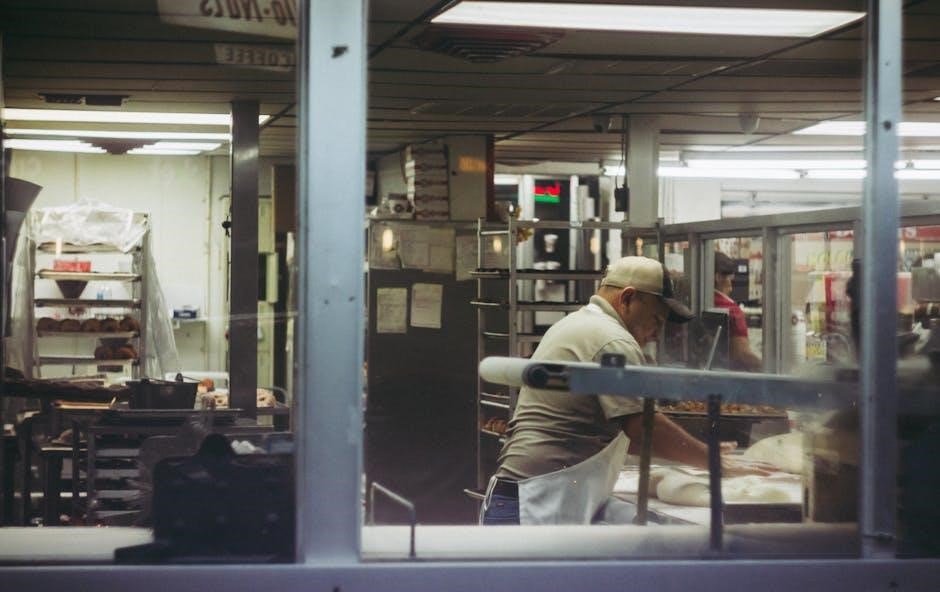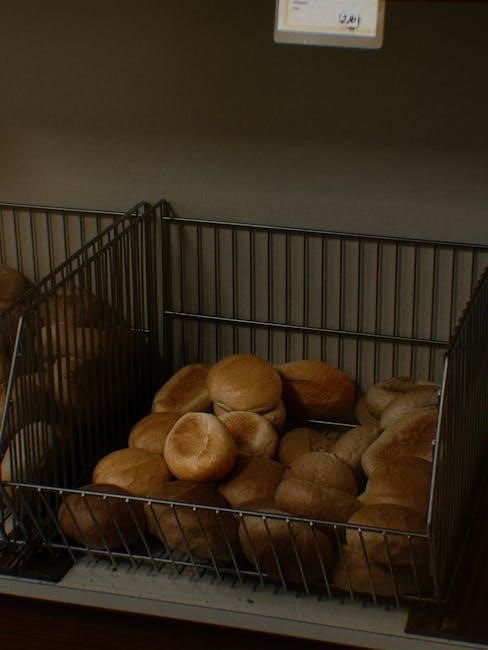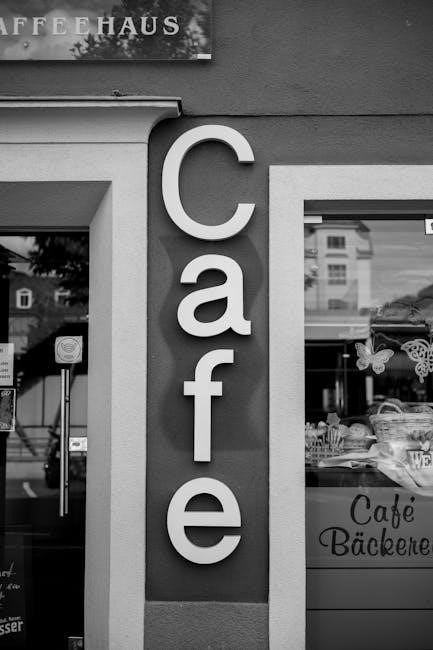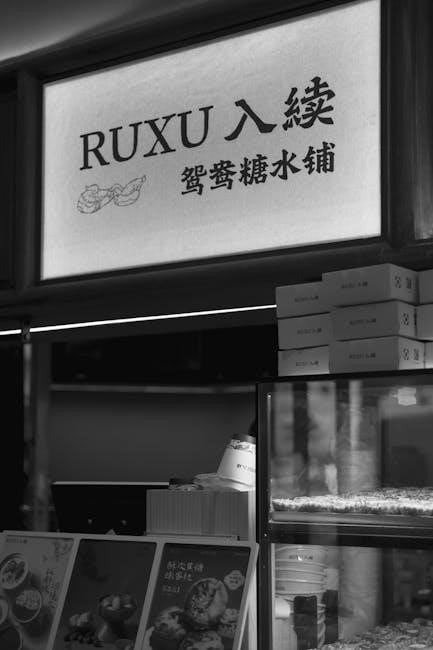Executive Summary
The bakery shop business plan outlines a strategy to establish a thriving bakery, focusing on quality products, excellent customer service, and efficient operations to ensure long-term success.
1.1 Business Overview
The bakery shop aims to provide high-quality, freshly baked goods, catering to local residents, cafes, and hotels. Offering a variety of bread, pastries, and cakes, the business focuses on using premium ingredients and traditional recipes. Targeting health-conscious consumers and food enthusiasts, the shop emphasizes quality, presentation, and customer satisfaction. Located in a busy area with accessible facilities, the bakery ensures efficient production and distribution processes, adhering to strict hygiene standards and sustainable practices to build a loyal customer base.

1.2 Vision and Mission Statement
Our vision is to become the leading local bakery, renowned for exceptional taste and quality. We aim to create a welcoming environment where customers feel at home. Our mission is to deliver fresh, handcrafted baked goods using premium ingredients while maintaining sustainable practices. We strive to build long-term relationships with our community by exceeding expectations and fostering trust through consistent excellence and personalized service, ensuring every bite is a delightful experience.
Our primary objectives include launching a successful bakery shop within six months, achieving a customer satisfaction rate of 90%, and capturing 15% of the local market share in the first year. Goals also encompass establishing strategic partnerships with suppliers and local businesses to ensure consistent quality and distribution. Additionally, we aim to implement eco-friendly practices and maintain a profit margin of 20% by the end of year two, ensuring sustainable growth and community engagement. The bakery market is growing rapidly, driven by increasing demand for fresh, organic, and specialty products. Local competition is fierce, emphasizing the need for a strong online presence. The bakery industry is experiencing steady growth, driven by increasing demand for fresh, organic, and specialty baked goods. Health-conscious consumers are seeking healthier options, while artisanal bakeries are gaining popularity. The rise of online ordering and delivery services has transformed how bakeries reach customers. With intense competition, differentiation through quality, innovation, and strong branding is crucial. The industry also faces challenges like rising ingredient costs and evolving consumer preferences, requiring adaptive strategies to maintain profitability and market relevance. The target market includes health-conscious individuals, young professionals, and families seeking fresh, high-quality baked goods. Additionally, food enthusiasts and those with dietary restrictions, such as gluten-free or vegan preferences, are key segments. The bakery will also cater to local cafes, restaurants, and event planners needing custom orders. By understanding consumer behavior and preferences, the bakery can tailor its offerings to meet diverse needs, ensuring strong customer loyalty and consistent demand. The bakery will compete with local bakeries, cafes, and retail stores offering similar products. Key competitors include established bakeries known for their traditional recipes and newer shops focusing on specialty items. By emphasizing high-quality, unique flavors, and excellent customer service, the bakery will differentiate itself. Strategic pricing, customizable options, and a strong online presence will further enhance its competitive edge, attracting a loyal customer base and positioning it as a preferred choice in the market. The bakery industry is experiencing a rise in demand for healthier, organic, and artisanal products, with consumers increasingly prioritizing quality and sustainability. Digital marketing and online ordering are becoming essential tools for attracting customers. Additionally, the trend toward home baking supplies presents new opportunities for ancillary revenue streams. By staying attuned to these shifts, the bakery can tailor its offerings to meet evolving consumer preferences and maintain a competitive edge in a dynamic market landscape. The bakery shop focuses on producing high-quality, traditional, and innovative baked goods, catering to diverse customer preferences while maintaining sustainable practices and exceptional customer satisfaction standards. The bakery shop operates primarily as a retail and wholesale business, supplying high-quality baked goods to local cafes, restaurants, and individual customers. The model focuses on creating consistent revenue streams through in-store sales, custom orders, and partnerships with local businesses. Emphasizing quality, freshness, and customer satisfaction, the business ensures long-term loyalty and growth. A strong online presence and efficient supply chain management further enhance operational efficiency and market reach. The bakery offers a diverse range of fresh, high-quality baked goods, including bread, pastries, cakes, and cookies, made with premium ingredients. Custom orders for special occasions, such as weddings and birthdays, are also available. Additionally, the shop provides catering services for events and partners with local cafes and restaurants for wholesale supply. The focus is on creating memorable experiences through exceptional taste and personalized service, ensuring customer satisfaction and loyalty. The production process involves precise steps to ensure high-quality products. Ingredients are sourced from trusted suppliers, with recipes optimized for flavor and consistency. Baking is done in state-of-the-art ovens, monitored by skilled staff to meet quality standards. Packaging is eco-friendly, preserving freshness and presentation. Regular audits and staff training maintain hygiene and efficiency, ensuring the bakery consistently delivers superior products that meet customer expectations and regulatory requirements while promoting sustainability. The bakery will be located in a prime, high-traffic area, ensuring visibility and accessibility. The facility will span 1,500 square feet, with a layout optimized for production, storage, and customer service. Equipped with modern baking equipment, the space will adhere to health and safety standards. A sustainability focus includes energy-efficient appliances and eco-friendly packaging. Ample parking and a welcoming storefront will enhance customer experience, making the bakery a convenient and attractive destination for the community. The bakery will implement a multi-channel approach, combining digital marketing, local SEO, and community engagement to attract customers. Seasonal promotions and loyalty programs will drive sales. The bakery will focus on creating a warm, inviting brand identity that emphasizes freshness, quality, and tradition. By leveraging storytelling and high-quality visuals, the bakery will differentiate itself in the market. The bakery will adopt a competitive pricing strategy based on cost analysis and market research. Prices will be set to ensure profitability while remaining affordable for the target market. The bakery will utilize multiple sales channels to maximize reach and revenue. Primary channels include the physical bakery location, online ordering platforms, and delivery services. Effective customer relationship management (CRM) is crucial for building loyalty and understanding customer needs. The bakery will operate efficiently with streamlined workflows, essential equipment, and skilled staff to ensure high-quality production and timely delivery, maintaining customer satisfaction always. The bakery will be located in a centrally accessible area with modern facilities, including commercial-grade mixers, ovens, and refrigeration units. The equipment ensures efficient production of high-quality baked goods. Storage areas will maintain ingredient freshness, and the layout will optimize workflow. Safety and hygiene standards will be prioritized to meet health regulations and customer expectations. The bakery will employ skilled bakers, sales staff, and managers, ensuring a team capable of delivering high-quality products and excellent customer service. Recruitment will focus on experience and passion for baking. Comprehensive training programs will cover baking techniques, safety protocols, and customer interaction. Ongoing workshops will ensure staff stay updated on industry trends and best practices, fostering a positive and productive work environment. Effective supply chain management ensures reliable sourcing of high-quality ingredients and materials. The bakery will establish relationships with trusted suppliers to maintain consistent delivery schedules. Inventory systems will track stock levels, minimizing waste and ensuring timely replenishment. A focus on cost efficiency and transparency will be prioritized, alongside sustainable sourcing practices to support environmental and ethical standards. This approach guarantees fresh, premium products while maintaining operational efficiency and customer satisfaction. The bakery will implement streamlined workflows to ensure efficiency and consistency; Daily operations will begin with ingredient preparation and baking, followed by packaging and display. Staff will be trained to manage their roles effectively, from production to customer service. Quality control checks will be conducted at each stage to maintain high standards. The workflow will prioritize timely order fulfillment and customer satisfaction, ensuring a seamless experience from production to delivery. This section outlines projected revenue growth, expense management strategies, and profitability forecasts to ensure the bakery’s financial sustainability and success. The bakery is projected to generate $250,000 in the first year, increasing by 8% annually for the next three years. Revenue growth will be driven by increasing customer demand, expanded product lines, and strategic marketing efforts. Seasonal variations, such as holiday sales, will also contribute to higher earnings during peak periods. By enhancing online presence and loyalty programs, the bakery aims to maximize sales and achieve sustainable growth in a competitive market. Initial startup costs for the bakery include equipment, ingredients, and rental fees, totaling $100,000. Monthly expenses will average $15,000, covering labor, utilities, and supplychain costs. Ingredient prices and energy consumption are key variables affecting profitability. By optimizing production workflows and sourcing cost-effective suppliers, the bakery aims to reduce overheads and maintain competitive pricing. Regular financial reviews will ensure efficient cost management and support long-term sustainability. The bakery requires an initial investment of $200,000 to cover startup costs, including equipment, lease, and initial inventory. Funding will be sourced through a combination of personal savings, bank loans, and investor contributions. A detailed breakdown of allocations ensures transparency, with $100,000 for equipment, $50,000 for lease and renovations, and $50,000 for ingredients and working capital. Repayment plans and interest rates will be finalized with financial institutions to ensure sustainable growth and profitability. The bakery aims to break even within the first 12 months of operation. Based on projected monthly sales of $30,000 and average monthly costs of $25,000, the break-even point is expected at 10 months. This analysis ensures the business can cover expenses and generate profit sustainably. Accurate financial projections and cost management will be crucial to achieving this target and securing long-term viability. The bakery plans to expand its market reach through strategic partnerships, product diversification, and exploring new customer segments. Sustainability initiatives will enhance brand loyalty and drive long-term growth. The bakery aims to expand its market presence by entering new geographic locations and exploring untapped customer segments. Strategic partnerships with local cafes, hotels, and corporate clients will drive growth. Leveraging online platforms and SEO will enhance visibility and attract a broader audience. By diversifying distribution channels and offering customized services, the bakery will capture new markets, ensuring sustained growth and increased brand recognition in the competitive food industry. To stay competitive, the bakery will diversify its product offerings by introducing gluten-free, vegan, and sugar-free options to cater to health-conscious consumers. Seasonal specials and customizable cakes for events will also be added to the menu. By innovating and adapting to consumer preferences, the bakery aims to attract a wider customer base and increase revenue streams, ensuring long-term sustainability and growth in the evolving market landscape. The bakery will implement advanced technology solutions to enhance efficiency and customer experience. This includes online ordering systems, digital inventory management, and CRM tools to track customer preferences and loyalty programs. Integration with suppliers will streamline procurement, while digital payment options will improve transaction speed. Additionally, automation in production will ensure consistency and reduce waste, enabling the bakery to scale operations effectively and maintain a competitive edge in the market. The bakery will prioritize eco-friendly practices, such as using biodegradable packaging and sourcing ingredients from local, organic suppliers. Energy-efficient equipment will reduce power consumption, and waste reduction programs will minimize environmental impact. A composting initiative will convert food waste into fertilizer for local farms. Additionally, partnerships with environmental organizations will promote sustainability efforts, aligning the bakery with global eco-conscious trends and enhancing its reputation as a responsible business.1.3 Objectives and Goals

Market Analysis
2.1 Industry Overview
2.2 Target Market
2.3 Competitive Analysis
2.4 Market Trends

Business Description
3.1 Business Model
3.2 Products and Services
3.3 Production Process
3.4 Location and Facilities

Marketing and Sales Strategy
4.1 Branding and Marketing
A strong online presence will be built through social media campaigns and local SEO, ensuring visibility in neighborhood searches. Partnerships with local businesses and community events will further enhance brand recognition and customer loyalty.4.2 Pricing Strategy
Flexible pricing models, such as discounts for bulk orders, will attract both individual customers and wholesale clients. A loyalty program will incentivize repeat purchases, fostering long-term customer relationships.
Premium pricing will be applied to specialty and custom items, leveraging high-quality ingredients and unique designs to justify higher costs.4.3 Sales Channels
Partnerships with local cafes, restaurants, and hotels will expand wholesale opportunities. Additionally, participation in farmers’ markets and food festivals will enhance brand visibility.
An e-commerce platform will allow customers to place orders online, with options for in-store pickup or delivery, ensuring convenience and accessibility.4.4 Customer Relationship Management
The bakery will implement a CRM system to track customer interactions, preferences, and purchase history.
Loyalty programs, personalized marketing, and regular feedback collection will enhance customer satisfaction.
Staff training will focus on delivering exceptional service, ensuring every customer feels valued and returns for more.Operations Plan
5.1 Facilities and Equipment
5.2 Staffing and Training
5.3 Supply Chain Management
5.4 Operational Workflows

Financial Projections
6.1 Revenue Projections
6.2 Cost Analysis

6.3 Funding Requirements

6.4 Break-Even Analysis
Growth Strategy
7.1 Market Expansion

7.2 Product Diversification
7.3 Technological Integration
7.4 Sustainability Initiatives
